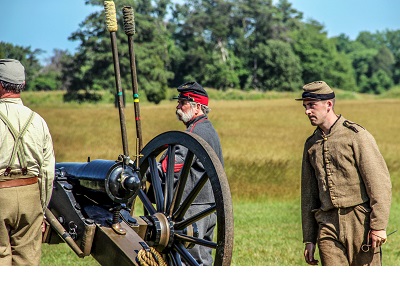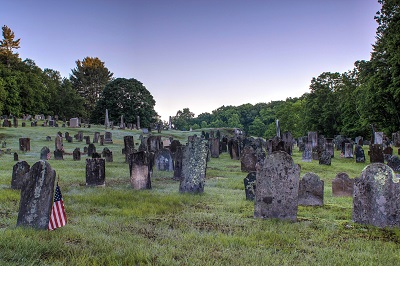Near there at the end, I recall, we was hungry,
hadn’t et for days, but’d marched light and dark,
never sleeping more’n minutes, shootin’ for
the Carolinas so’s we could keep up the fight
in the wrinkles of the Blue Ridge Mountains.
Good God it rained, but it rained! Every river
was swoll up and most flooded. We was cold
and no one had boots left, socks even, just
bloodied soles. At the last, them Yankees
came at us like dogs who’d worried their hunt
to a hole and it was close and hot there for a while.
I recall puttin’ my piece to the back o’ the head
of one of them blue coats and pullin’ the trigger.
After all the fightin’ up ’til then
I can tell you my charges never failed,
no matter how wet or cold it got.
As he fell I realized t’was my best friend,
the one what had convinced me to sign up with him
back at the start. ‘Spite what the officers had told us,
he had took the coat off’n a dead Yankee days ago
rather than worryin’ t’freeze t’death.
I left that blue coat on him as I tucked him in
and pulled the dirt blanket o’er his head,
so’s he could sleep warm that night.
Now, looking back, I wonder, that when I go too,
will I be sleepin’ warm down there?
I don’t doubt I ought, I don’t.
This is the final of two poems dealing with the American Civil War that were inspired by reading Killing Lincoln. I recommend that any non-Americans who aren’t quite as familiar with this war, read the explanation accompanying that first post, Sailor’s Creek, as a quick background to understand the key roles of that conflict.
Even after reading that first post, here are a few further notes:
1) Marse (short for ‘Master’) Robert was a term of deep affection Lee’s troops used to refer to him.
2) Lee’s plan after quitting Petersburg and the fall of the Confederate capital of Richmond was to escape to the Carolinas, where support for the Confederacy was high, there to fight a guerrilla war from the easily defended Blue Ridge Mountains. His retreat, however, was betrayed by Confederate looters who stole the army’s rations. The route was also eventually cut off by Grant, forcing Lee’s surrender at Appomattox.
3) While, in fact, both sides wore a variety of colors in their uniforms, generally the Confederate South (the ‘Rebels’) wore gray and the Union North (the ‘Yankees’) wore blue. Certainly, the grays and the blue coats became standard terms used by both sides to refer to themselves and each other.
4) This story is real in so far as it is historically correct and it is recorded that on at least one occasion a Confederate soldier in the last few days of battle killed his best friend because that friend, like many others and against orders, was wearing a coat stolen from a dead Northern soldier. The rest of the story, and especially the fear of the fires of hell, is my invention.
5) To be honest, I have no idea if I have authentically caught the patois of the Virginian accent, or just done a poor job of imitating a Hollywood version of that accent. But from the start it was clear to me that the poem had to be told in the first person and modern rules of diction just wouldn’t do. The point is that the soldier was a rustic from a rustic time, dealing with a terrible conditions and burdened by a horrendous act of guilt. That, I hope, still emerges. The word ‘et’ in the second line means ‘eaten.’
6) The ‘piece’ referred to by the speaker would have been his front-loaded musket rifle. Repeating Spencer rifles with modern bullets were introduced at the very end of the war, but only in the North and in very limited supply. By far the most common weapon for both sides was a long-barreled musket, where the gunpowder charge was loaded from the front, then a lead bullet and the whole tamped into place by a rod; an explosive cap was then placed under the hammer. Keeping your powder cartridges and caps dry and being able to perform quick re-loads, even in damp conditions, was the sign of a professional soldier. By this stage of the war, both sides were very, very good at doing this because if a soldier wasn’t, he was long dead.
Thank you for reading Hope Marse Robert’ll speak up for me. I humbly appreciate your visiting the Book of Pain, and as always, I look forward to your comments.
The photograph was taken at a Civil War re-enactment at Williamsburg, Virginia. The actors were a Southern troop of artilleryman and my standing so close to get that shot meant several hours of ringing ears from the one round they let off. What a real battlefield was like I can hardly, and do not really want to, imagine. For more photography, please visit the Book of Bokeh.
john
Photograph, poem and notes © 2014 by John Etheridge; all rights reserved. The poem and accompanying notes are licensed under the Creative Commons Attribution-Noncommercial-No Derivative Works 3.0 Unported License. This applies to all original written work found on this site, unless noted otherwise. The attribution claimed under the license is: © 2014 by John Etheridge, https://bookofpain.wordpress.com. The photograph is not licensed for use or reproduction in any way, unless so granted in writing by the copyright owner.



